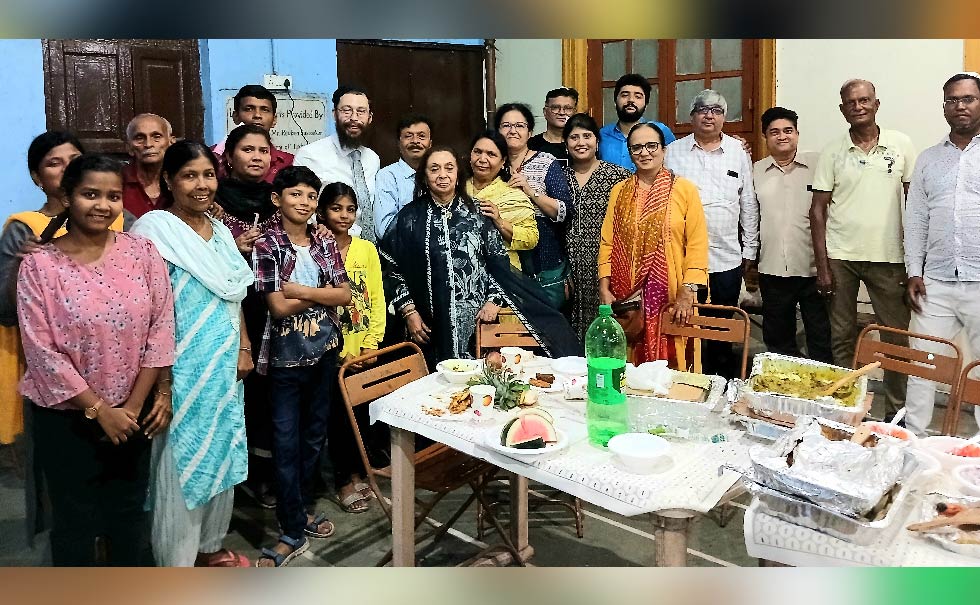Rosh Hashanah 2020
BS” D
Shalom,
Approximately two weeks ago my family and I sat down on Ben Yehuda Street in Jerusalem for a bagel, not a particularly exhilarating experience, we sat and ate, made the Birkat Hamazon prayer following our meal, and got up from our table. A few seconds later a hardwood cabinet smashed through the catering umbrella outside of the restaurant set up for socially distanced tables.
A man in his late thirties without a shirt began to lob bricks, metal rods, and panes of glass from his top floor flat onto the street and pedestrians below, as we scurried to a safe distance a large crowd began forming, and almost immediately the police arrived on the scene. Looking back at the restaurant we knew that had we lingered even a few more seconds the cabinet would have collided directly with where we were seated only a moment ago, the very spot that our stroller was parked with our son in the shade.
To a certain extent, this year has been for many of us one with a touch of closeness to death and calamity; we know people who have died or become sick from an the illness we seem powerless to combat despite the measures we have all taken as a collective society to look after our most vulnerable individuals and protect the national health services so that they could remain operational.
The closeness of disaster is an ever-present threat in life, on the road traveling, sickness, and crime rank high in our collective daily brushes with the uncertain. The Coronavirus has so deeply affected us because of its closeness; none of us want to get sick and none of us want to potentially infect anyone else. Although deaths from Alcohol, Tobacco, and diabetes rank high, they are so to speak in our minds to a degree preventable, hunger and sickness from lack of potable water account for a high percentage of deaths and yet as a society we seem prepared to accept this great inequality: At the time of writing this article, according to the WHO and Wikipedia there have been 28.8 million cases worldwide and 921000 deaths, in many countries the hospitals and health providers and have been utterly overwhelmed.
A virus is, in a sense an equalizer; the virus does not discriminate – wherever there is a lack in the defensive abilities of the immune system a virus can enter and cause havoc.
In a system as disparate as ours where 6,328,327 die from hunger and issues caused by malnutrition and poverty in terms of access to food (Source: www.theworldcounts.com), we are facing social issues way beyond the scale of Coronavirus that until now we have not collectively dealt with as seriously as this crisis, perhaps now that we have taken this step we can begin to have the power and connectivity to surmount the most pressing social issues of our times.
Necessity is as they say; the mother of invention, and as a result of these unprecedented times new ways of working, educating, and communicating have emerged to try to maintain the very fabric of the world as we know it to operate – certainly the way we work will never be the same again, in terms of remote working and teleconferencing. The Torah world has also responded with online shiurim, prayer services, and counseling services to bridge the gap between Halacha and circumstance. The sheer wealth of connectivity with organizations, companies, NGO’s, and individuals have never been so available. The various waves of social change and political demonstrations are organized and created on social media in moments rather than decades; the whole planet can get behind a certain movement or ideology in a weekend.
Hopefully, as a society, we are progressing towards a place where we are becoming increasingly aware of those in society who are less fortunate as well as more vulnerable. Around us the symptoms of a planet and society in crisis are readily diagnoseable, we have catapulted a fraction of the population into wealth, luxury, and security at the expense of an underprivileged majority.
Our seas and environment bear the brunt of our desire for convenience and the vast consumption of plastic and fossil fuels. Our families’ lives are stretched and scars of divorce, addiction, and alienation are all too common, for despite our elevated position we have not managed to achieve a better existential quality of existence. Perhaps now the tools to undo some of the more childish destruction of our planet and degrading of our fellow man. I am reminded of a powerful statement from our Sages:
“Any generation in which the temple is not rebuilt is held liable for its destruction” – Talmud Yerushalmi, Yoma 11a.
We can no longer hope towards a time when the situation/technology/political infrastructure/market will be ideal for tackling these global issues we have created, it is upon us to act today. We must build a world fitting of having a temple reside in it, rather than expecting a temple to somehow automatically our reality.
It has been a year of extreme emotions and unique circumstances; families have shown incredible resilience to the situation, most especially the children.
Our daughter has been attending Indian school on Zoom most days since we returned to Israel, it has been a very healthy and helpful outlet and it is to the credit of her teachers that they have employed creative strategies and ingenuity to keep the students engaged day by day. It has been in those times when parks reopened here that I saw how deeply children were missing the social aspects of the school system and that no online system could truly replace this.
Other industries have moved online including Kashrut and as part of a team of Rabbis and auxiliary staff in hundreds of locations have been able to remotely visit hundreds of plants and factories globally. It’s been a challenge to adapt to reality and in some ways, the systems that we have implemented are extremely useful at investigating specific issues.
My Wife has also continued to teach singing and music online for students in a variety of countries as well her regular Torah Shiurim for the Machon Ora seminary and we have had the privilege of meeting many of the students personally from relationships originally built digitally.
Our original plans were to be at the Paradesi Synagogue for Rosh Hashanah, Yom Kippur, and Sukkot, instead we find ourselves at home in Jerusalem unsure of when we will be able to return.
It was a blessing that no one was hurt when we sat for our bagel and that we have all been healthy and unaffected by the virus, our lives in terms of Shlichut and the future direction hang on a moment when these restrictions and lockdowns ease to allow travel once again.
I pray that this coming year is one of profound human development and above all further peace.
Rabbi Jonathan Goldschmidt




